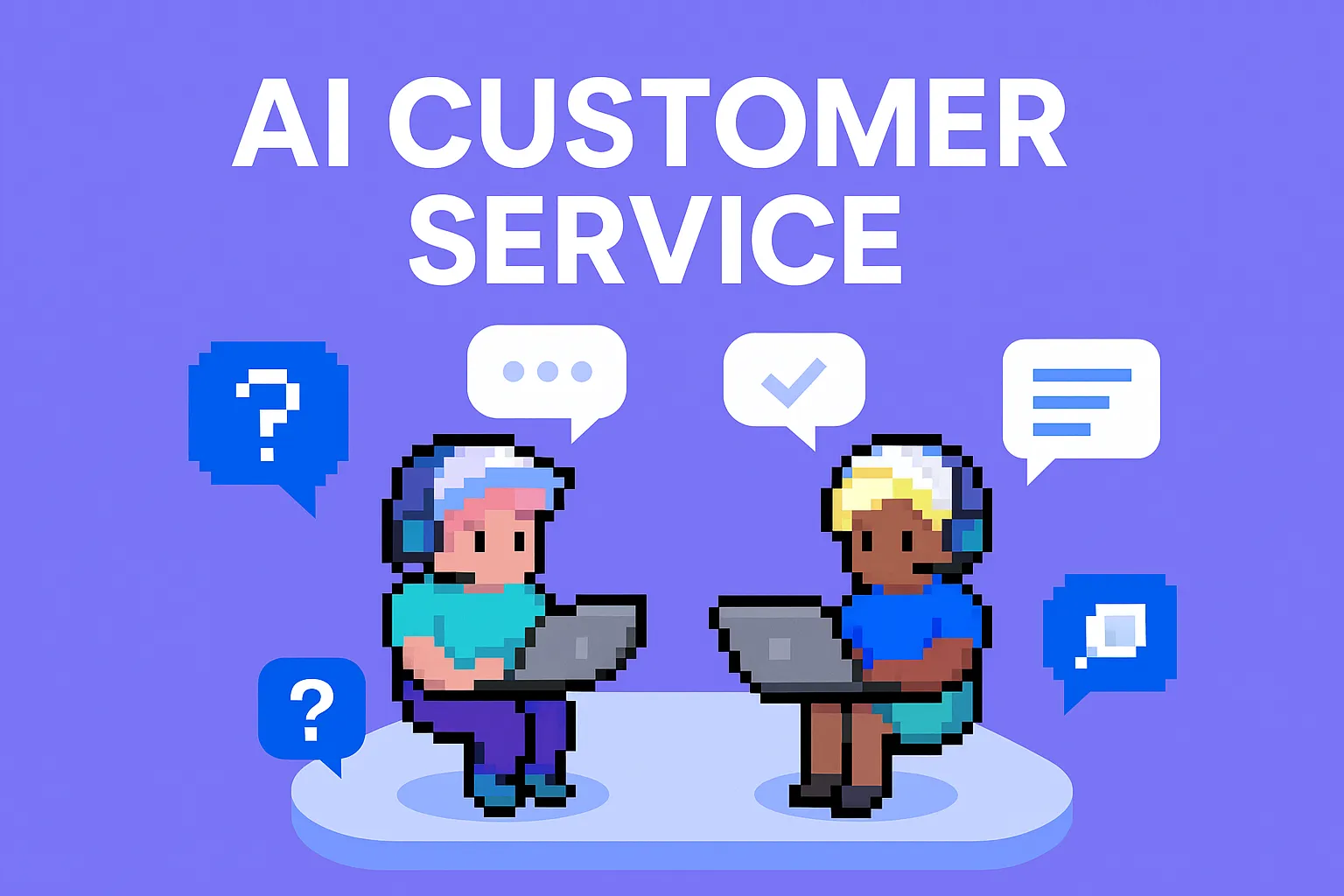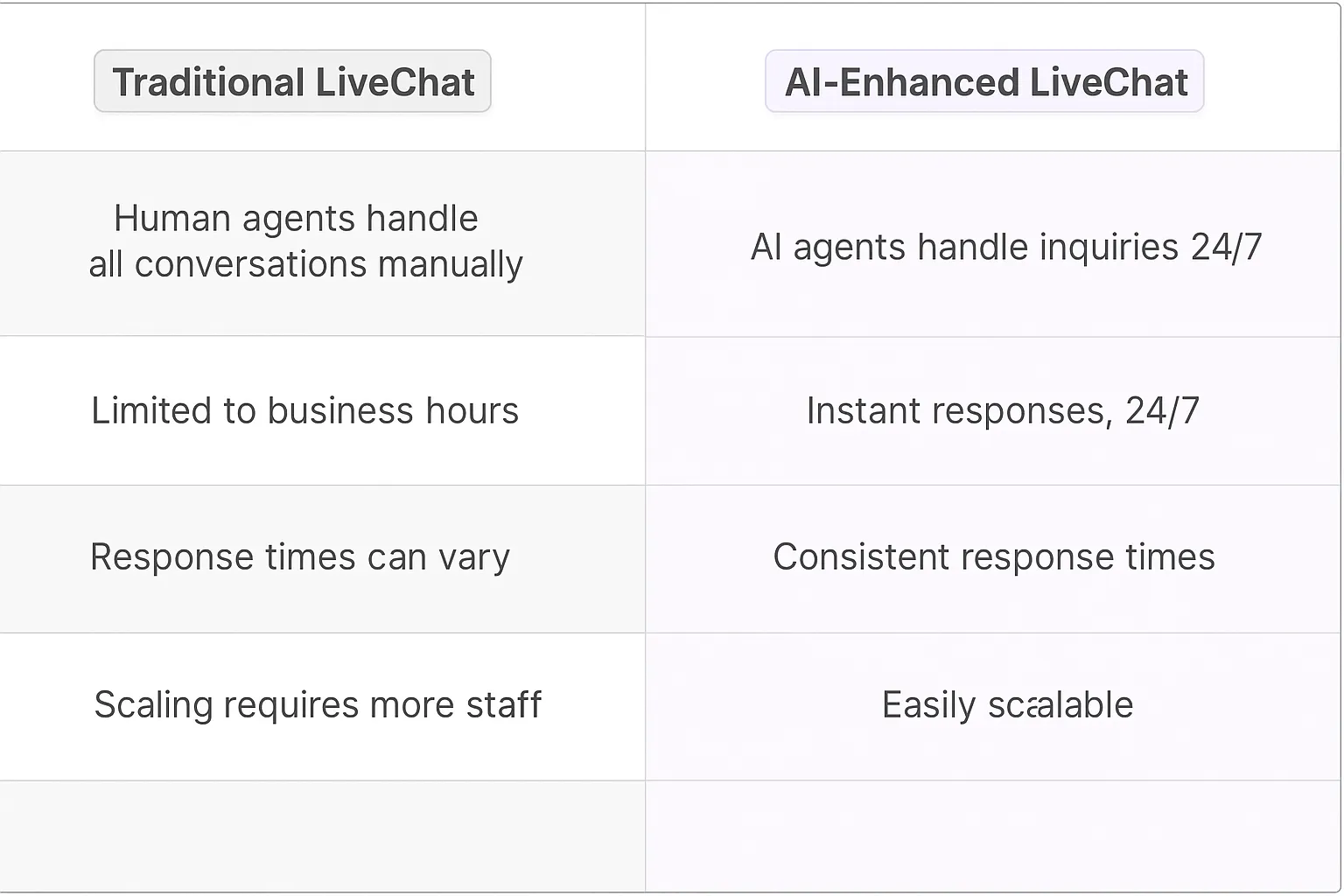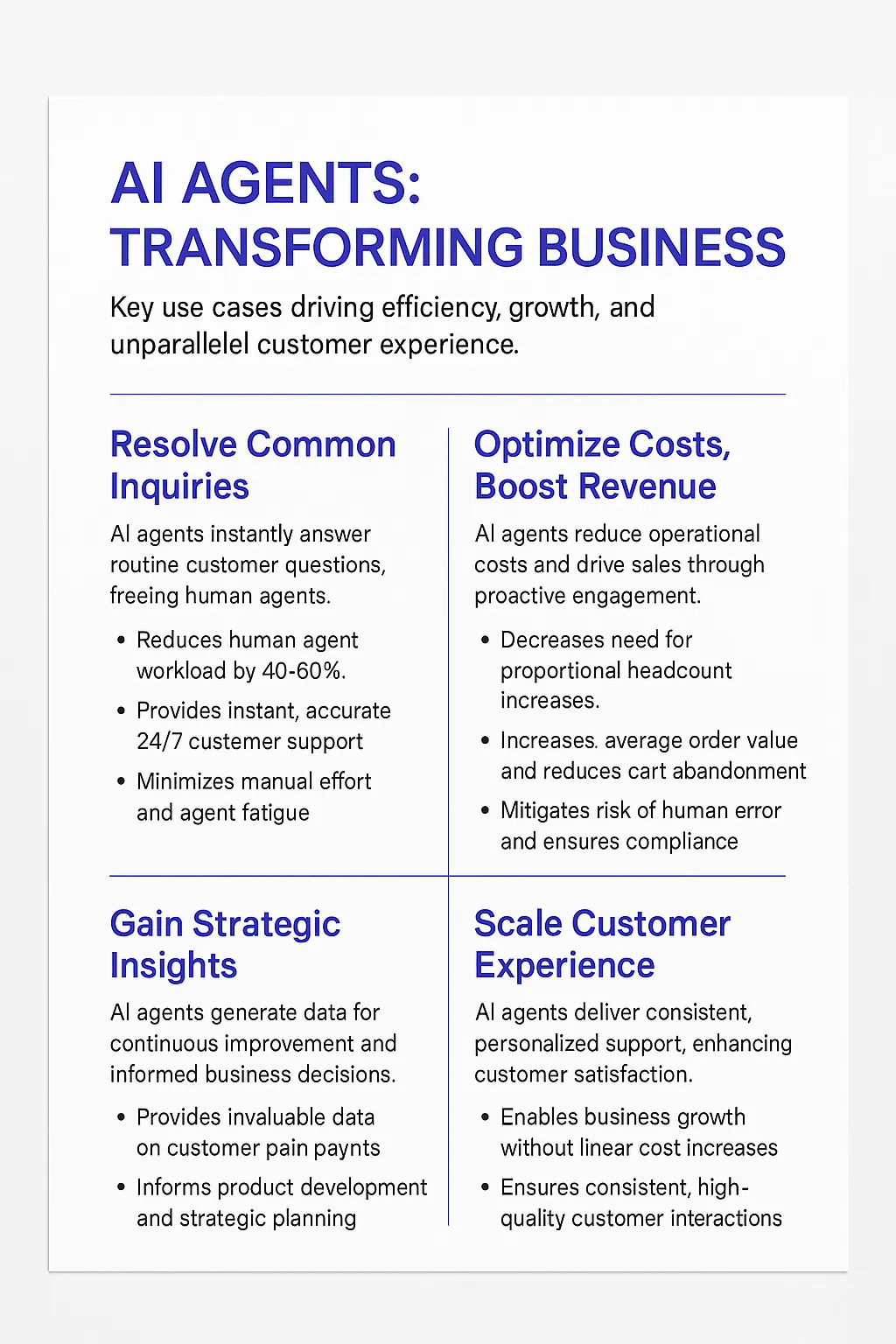LiveChat
Understanding LiveChat's Core Platform and Features
LiveChat is a comprehensive customer service platform that enables real-time communication between businesses and their customers. The platform combines messaging capabilities with customer data management, analytics, and integration options to create seamless support experiences. Unlike basic chat widgets, LiveChat provides enterprise-grade features for managing customer conversations at scale.
Key Features of LiveChat
The platform's core functionality includes real-time visitor monitoring, customizable chat widgets, detailed analytics, and robust API integrations. Advanced features like custom greetings, automated triggers, and detailed visitor information help support teams provide contextual, personalized responses. The system also includes built-in file sharing, canned responses, and multi-channel messaging capabilities to streamline customer interactions.

Benefits of AI Agents for LiveChat
What would have been used before AI Agents?
Traditional LiveChat setups relied heavily on human agents managing multiple conversations simultaneously, often juggling repetitive questions while trying to maintain response quality. Support teams created massive knowledge bases and canned responses, but the manual effort to find and customize these responses created lag time and inconsistent customer experiences. Teams also struggled with after-hours coverage and peak demand periods, leading to longer wait times and frustrated customers.
What are the benefits of AI Agents?
AI Agents transform LiveChat from a basic communication tool into an intelligent conversation platform. These digital teammates handle the heavy lifting of common customer inquiries, giving human agents more bandwidth for complex problem-solving and relationship building.
The network effects are particularly powerful - each interaction makes the AI more adept at pattern recognition and response accuracy. Unlike static chatbots, AI Agents learn from every conversation, developing deeper understanding of customer intent and improving their ability to resolve issues independently.
From a growth perspective, AI Agents create a compelling scaling dynamic. Support teams can expand coverage to 24/7 without proportionally increasing headcount. The marginal cost of each additional conversation approaches zero, while maintaining consistent quality across all interactions.
The data insights generated by AI Agents also provide unprecedented visibility into customer pain points and opportunities. Support leaders can identify trending issues, optimize knowledge bases, and make product improvements based on actual conversation patterns rather than anecdotal feedback.
Most significantly, AI Agents shift LiveChat from a reactive support channel to a proactive customer success tool. They can identify upsell opportunities, suggest relevant resources, and guide users toward value-driving features - all while maintaining natural conversation flow that feels authentic and helpful rather than pushy or robotic.

Potential Use Cases of AI Agents with LiveChat
Processes
- Lead qualification and routing based on conversation context and customer data
- Multi-language customer support through real-time translation and cultural adaptation
- After-hours customer engagement with seamless handoff to human agents
- Product recommendation engine driven by conversation analysis and purchase history
- Customer sentiment analysis with proactive escalation to senior support staff
Tasks
- Instant response to common customer inquiries about pricing, features, and technical specs
- Scheduling appointments and demos while collecting relevant customer information
- Processing simple refund requests and order modifications
- Gathering initial troubleshooting information before human agent involvement
- Creating support tickets with detailed context from chat conversations
- Sending personalized follow-up resources based on chat interactions
Growth-Driven Implementation Strategy
The integration of AI agents into LiveChat represents a fundamental shift in customer interaction dynamics. Smart companies deploy these digital teammates strategically, focusing on high-volume, repeatable interactions that benefit from rapid response times.
The most successful implementations start with a focused scope - typically handling 3-4 common customer scenarios that make up 40-60% of total chat volume. This creates immediate value while building team confidence in the technology.
As the system processes more conversations, it develops increasingly sophisticated response patterns. The key success metric isn't just response speed - it's the completion rate of customer interactions without human intervention while maintaining high satisfaction scores.
Companies seeing the strongest ROI pair their AI agents with robust analytics that track not just conversation metrics but also conversion rates, customer lifetime value, and support team productivity gains. This data-driven approach enables continuous optimization of the AI's role in the customer journey.
Implementation Best Practices
- Build a knowledge base of common customer interactions before deployment
- Create clear escalation paths for complex issues requiring human expertise
- Establish KPIs that balance efficiency gains with customer satisfaction
- Regular review and refinement of AI responses based on customer feedback
- Continuous training of support teams on optimal collaboration with AI agents

Industry Use Cases
LiveChat AI agents are transforming how businesses connect with customers across multiple sectors. The integration of AI into live chat platforms creates opportunities for deeper, more meaningful customer interactions while reducing response times and workload on human teams. Let me break down some fascinating real-world applications I've observed while working with companies implementing these solutions.
What's particularly compelling about LiveChat AI agents is their ability to adapt to industry-specific contexts. They're not just generic chatbots - they're specialized digital teammates that understand the nuances of each sector's unique challenges and customer expectations. Through pattern recognition and continuous learning, these AI agents become increasingly proficient at handling industry-specific queries and processes.
The most successful implementations I've seen combine AI capabilities with human expertise, creating a hybrid approach that maximizes the strengths of both. This synergy allows businesses to scale their customer service operations while maintaining the personal touch that customers value. The following industry examples demonstrate how organizations are achieving remarkable results by deploying AI agents within their LiveChat systems.
E-commerce: Converting Browsers into Buyers with LiveChat AI
E-commerce represents the perfect testing ground for LiveChat AI agents. The metrics are clear and compelling - abandoned carts cost online retailers $18 billion annually, with 75% of shoppers leaving sites due to insufficient product information or delayed support responses.
A digital teammate integrated into LiveChat can monitor customer behavior patterns and proactively engage at critical moments. When a visitor hovers on a product page for over 30 seconds or toggles between size options repeatedly, the AI initiates a conversation with specific product details and sizing guidance. This targeted intervention addresses hesitation points before they lead to abandonment.
The AI's deep product knowledge allows it to make contextual recommendations based on browsing history, cart contents, and previous purchases. For example, if a customer is viewing running shoes, the AI can suggest appropriate socks, insoles, and running gear that other buyers frequently purchased together.
Beyond basic product support, the AI handles complex scenarios like shipping calculations, return policies, and inventory checks across multiple warehouses. When a desired item is out of stock, it automatically presents similar alternatives within the customer's specified price range and style preferences.
The results speak volumes - e-commerce sites implementing LiveChat AI typically see a 23% reduction in cart abandonment and a 15% increase in average order value. The AI's ability to engage customers 24/7 with zero wait times creates a frictionless shopping experience that drives both conversion and customer satisfaction.
For online retailers facing intense competition and rising customer acquisition costs, LiveChat AI represents a strategic advantage in converting browsers into loyal buyers through personalized, timely support at scale.
Healthcare: Transforming Patient Support with LiveChat AI
Healthcare organizations face mounting pressure to deliver responsive patient support while managing staffing constraints. The numbers paint a stark picture - 68% of patients switch providers due to poor communication experiences, while medical staff spend 20% of their time answering routine questions that could be automated.
LiveChat AI acts as a digital front desk, fielding common patient inquiries about appointment scheduling, prescription refills, insurance coverage, and basic medical questions. The AI maintains HIPAA compliance while accessing approved medical knowledge bases to provide accurate, consistent information.
When a patient messages about concerning symptoms, the AI uses natural language processing to assess urgency and severity. For non-emergency situations, it can schedule appointments and provide relevant educational resources. For urgent cases, it immediately escalates to on-call medical staff while collecting preliminary information.
The system excels at post-visit follow-up, sending automated check-ins to monitor recovery progress and medication adherence. If a patient reports worsening symptoms or side effects, the AI alerts the appropriate care team member for intervention.
Healthcare providers implementing LiveChat AI report a 42% reduction in phone call volume and 31% faster response times to patient inquiries. More importantly, they see improved patient satisfaction scores and better adherence to treatment plans through consistent engagement.
The AI also helps optimize resource allocation by handling administrative tasks like insurance verification, appointment reminders, and basic billing questions. This allows medical staff to focus their time on direct patient care rather than routine paperwork.
For healthcare organizations seeking to enhance patient engagement while controlling costs, LiveChat AI delivers measurable improvements in operational efficiency and care quality. The technology serves as a scalable solution for providing responsive, personalized support across the entire patient journey.
Considerations and Challenges
Implementing LiveChat AI agents requires careful planning and strategic consideration across multiple dimensions. The complexity goes beyond simple deployment - organizations must navigate both technical hurdles and human factors to create truly effective digital teammates.
Technical Challenges
Natural language processing remains a significant technical barrier, particularly with domain-specific terminology and context. AI agents need extensive training data to understand industry jargon, product names, and company-specific terms. Integration with existing systems presents another layer of complexity - from CRM platforms to knowledge bases, each connection point requires careful API management and data handling protocols.
Real-time performance optimization becomes critical at scale. As conversation volumes grow, response latency and processing capabilities need constant monitoring and adjustment. Load balancing and failover systems must be robust enough to handle traffic spikes while maintaining conversation continuity.
Operational Challenges
The human side of implementation often proves more complex than the technical aspects. Customer service teams need clear guidelines on when to intervene in AI conversations. Without proper protocols, agents may either jump in too quickly, undermining the AI's effectiveness, or wait too long, risking customer satisfaction.
Knowledge management becomes increasingly critical as the AI system learns and evolves. Teams must establish processes for regular content updates, conversation reviews, and performance monitoring. This includes tracking both quantitative metrics like resolution rates and qualitative factors like conversation tone and customer sentiment.
Strategic Considerations
Organizations must carefully define the scope of their AI implementation. Starting too broad can overwhelm both the system and support teams, while being too narrow limits the potential impact. A phased rollout strategy, beginning with specific use cases and gradually expanding, often proves most effective.
Privacy and security considerations need thorough examination. Customer data handling, conversation logging, and compliance requirements vary by industry and region. Teams must establish clear policies for data retention, access controls, and regulatory compliance before deployment.
AI-Powered Evolution of Customer Service
The integration of AI Agents with LiveChat represents a significant evolution in customer service technology. By combining intelligent automation with human expertise, organizations can scale their support operations while maintaining personal connections with customers. The data-driven insights and continuous learning capabilities of AI Agents create compound benefits over time, improving both operational efficiency and customer satisfaction. As this technology continues to mature, businesses that effectively deploy AI Agents within their LiveChat systems will gain significant competitive advantages in customer experience and operational scalability.













